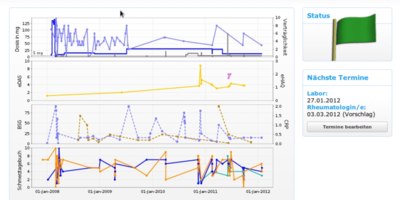Studie zu Sulfasalazin bei der Behandlung der Anteriore Uveitis
Eine relativ neue Indikation für Sulfasalazin ist der Einsatz bei der anterioren Uveitis (Iritis, Regenbogenhautentzündung).
Wir selber setzen Sulfasalazin in dieser Indikation zwar schon mit gutem Erfolg seit Anfang der 90er Jahr ein. Bislang gab es aber dazu noch keine systematischen Studien, die diese Indikation auch auf einem höheren Level der wissenschaftlichen Evidenz belegen.
Benitez und Mitarbeiter (2000) führten nun eine Studie mit 22 Patienten mit anteriorer Uveitis im Rahmen einer ankylosierenden Spondylitis durch. In einem randomisierten, Design erhielten 10 Patienten Sulfasalazin; 12 Patienten dienten als Kontrolle. Alle Patienten wurden über 3 Jahre nachbeobachtet.
Sulfasalazin führte zu einer signifikanten Abnahme der Uveitis-Rezidive; außerdem hatten weniger der mit Sulfasalazin behandelten Patienten am Ende der Studie (nach Ablauf von 3 Jahren) schwere persistierende posteriore Synechien (bleibende Verklebungen im Auge als Folge der abgelaufenen Entzündung).
Autor: Priv. Doz. Dr. med. H.E. Langer
Literatur:
Im folgenden ist die oben zitierten Studie im Abstract wiedergegeben.
Sulfasalazine in the prevention of anterior uveitis associated with ankylosing spondylitis.
Benitez-Del-Castillo JM, Garcia-Sanchez J, Iradier T, Banares A. Instituto Investigaciones Oftalmologicas Ramon Castroviejo, Facultad de Medicina, Universidad Complutense, Madrid, Spain.
Eye 2000 Jun;14 ( Pt 3A):340-3
PURPOSE: To assess the effects of sulfasalazine in preventing recurrences and reducing the severity of anterior uveitis associated with ankylosing spondylitis and chronic intestinal inflammation. METHODS: Twenty-two patients with anterior uveitis associated with ankylosing spondylitis were studied. Ten patients were randomised to receive oral sulfasalazine (group 1) and 12 patients randomised to no treatment (group 2); all were followed for 3 years. Blood-aqueous barrier permeability was determined by fluorophotometry and bowel biopsies were taken. RESULTS: A statistically significant difference was observed between the two groups regarding the number of recurrences of uveitis (p = 0.016). The blood-aqueous barrier permeability was significantly higher during acute attacks in group 2 (group 1: 31.3 +/- 26.4 x 10(-4) min-1 vs group 2: 66.2 +/- 28.5 x 10(-4) min-1; p = 0.019) but not during the disease-free period. We observed a higher incidence of chronic intestinal inflammation at the end of the study in group 2 (group 1: 3/8 vs group 2: 7/9, p = 0.153). No relation was observed between blood-aqueous barrier permeability and the number of recurrences. The number of patients with severe persistent posterior synechiae at the end of the study was higher in group 2 (group 1: 4 patients before and 4 patients at the end; group 2: 4 patients before and 8 patients at the end; p = 0.65). CONCLUSION: Sulfasalazine may be beneficial in preventing recurrences and reducing the severity of anterior uveitis associated with ankylosing spondylitis.


